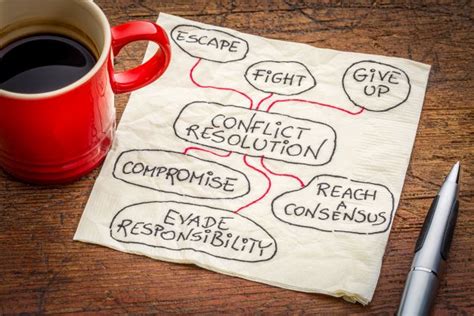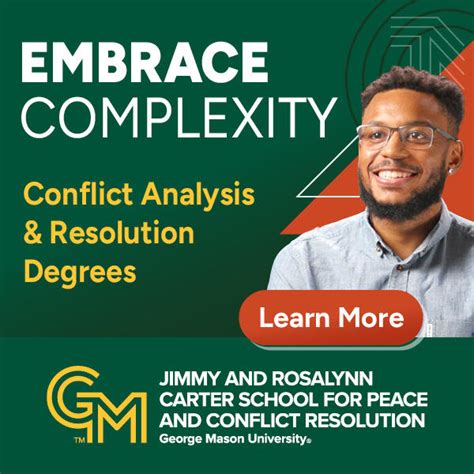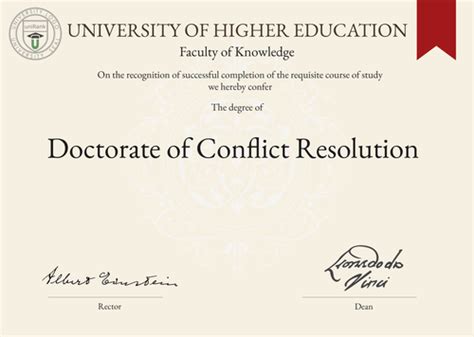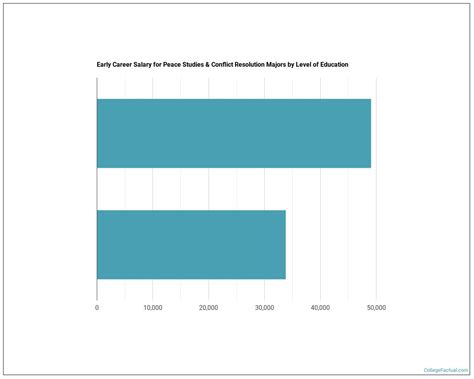Conflict Resolution Degree

Conflict is an inevitable part of human interaction, and its effective resolution is a crucial skill in various professional and personal settings. The field of conflict resolution has gained significant recognition, leading to the development of specialized degree programs aimed at equipping individuals with the knowledge and tools to navigate and resolve conflicts constructively. This article explores the depth and breadth of a Conflict Resolution Degree, highlighting its curriculum, real-world applications, and the impact it can have on individuals and communities.
Understanding the Conflict Resolution Degree

A Conflict Resolution Degree is an academic program designed to educate students in the principles, theories, and practices of conflict management and resolution. This interdisciplinary field draws from various disciplines, including psychology, sociology, communication, law, and international relations, to provide a comprehensive understanding of conflict dynamics and effective strategies for resolving them.
Curriculum and Key Courses
The curriculum of a Conflict Resolution Degree is tailored to develop a strong foundation in conflict analysis, negotiation, mediation, and peacemaking. Key courses may include:
- Introduction to Conflict Resolution: An overview of the field, covering the history, theories, and models of conflict resolution.
- Communication and Conflict: Exploring the role of effective communication in conflict situations, with a focus on active listening, empathy, and non-violent communication techniques.
- Negotiation Strategies: Teaching students the art of negotiation, including preparation, tactics, and the various stages of the negotiation process.
- Mediation and Dispute Resolution: A practical course on mediation techniques, where students learn to facilitate dialogue and guide parties towards mutually beneficial outcomes.
- Cultural Perspectives on Conflict: Examining how cultural differences influence conflict dynamics and resolution approaches, fostering an understanding of diverse perspectives.
- Conflict Analysis and Prevention: Equipping students with tools to analyze and identify the root causes of conflicts, as well as strategies for prevention and early intervention.
- International Conflict and Peacebuilding: A focus on conflicts at the global level, exploring the role of international organizations, diplomacy, and peacebuilding initiatives.
- Research Methods in Conflict Resolution: Providing students with the skills to conduct research, evaluate existing literature, and contribute to the evolving field of conflict resolution studies.
Skills Development and Practical Training
Beyond theoretical knowledge, a Conflict Resolution Degree emphasizes practical skills development. Students often engage in simulations, role-playing exercises, and case studies to apply their learning in realistic scenarios. Many programs also incorporate internships or fieldwork opportunities, allowing students to gain hands-on experience in various settings, such as community organizations, government agencies, or international peacebuilding initiatives.
Real-World Applications of Conflict Resolution

Graduates of Conflict Resolution programs find themselves equipped with a unique skill set that is highly valued in a wide range of professional contexts. Here are some key areas where their expertise can make a significant impact:
Mediation and Dispute Resolution
Conflict resolution graduates often pursue careers as mediators, helping parties in conflict to communicate effectively, understand each other’s perspectives, and reach mutually agreeable solutions. This skill is invaluable in legal settings, community disputes, and workplace conflicts.
| Conflict Type | Mediation Approach |
|---|---|
| Neighborhood Dispute | Facilitate dialogue, identify common goals, and propose creative solutions to maintain harmony. |
| Labor Union Negotiations | Act as a neutral third party, guiding negotiations and ensuring fair representation for both sides. |
| Divorce Proceedings | Mediate complex emotional conflicts, focusing on the well-being of children and fair distribution of assets. |

Community Building and Peace Initiatives
Conflict resolution expertise is essential in community development and peacebuilding efforts. Graduates can work with local organizations, NGOs, or government bodies to promote social cohesion, address systemic conflicts, and foster sustainable peace.
International Relations and Diplomacy
The skills acquired through a Conflict Resolution Degree are highly relevant in international relations. Graduates can contribute to diplomatic efforts, conflict prevention, and post-conflict reconstruction, working with intergovernmental organizations or as advisors to governments.
Organizational Conflict Management
In the corporate world, conflict resolution specialists play a crucial role in maintaining a harmonious and productive work environment. They assist in managing conflicts between employees, departments, or even across international branches, ensuring efficient and fair resolution processes.
Education and Training
Conflict resolution professionals are often sought after to design and deliver training programs on conflict management for various organizations and institutions. They can educate employees, students, and community members on conflict prevention, resolution strategies, and cultural sensitivity.
The Impact of Conflict Resolution Education
The study and practice of conflict resolution have far-reaching implications, both at the individual and societal levels. Here are some key ways in which Conflict Resolution Degrees contribute to a more peaceful and harmonious world:
Enhancing Communication and Empathy
Conflict resolution education fosters better communication skills and a deeper understanding of diverse perspectives. This leads to more effective collaboration, reduced misunderstandings, and the ability to build stronger relationships.
Promoting Peace and Stability
By equipping individuals with the skills to identify and address conflicts at their early stages, Conflict Resolution Degrees play a vital role in preventing the escalation of conflicts into violent or destructive outcomes. This contributes to the overall stability and well-being of communities and nations.
Empowering Individuals and Communities
Graduates of Conflict Resolution programs often become agents of change in their communities. They empower individuals to stand up for their rights, resolve conflicts peacefully, and contribute to the development of a more just and equitable society.
Addressing Systemic Issues
Conflict resolution specialists are well-positioned to tackle systemic conflicts and inequalities. They can work with organizations and governments to address issues such as racial disparities, gender-based violence, or economic injustices, promoting sustainable solutions and long-term social change.
Building a Culture of Peace
Through their work in education, training, and community engagement, conflict resolution professionals contribute to the creation of a culture of peace. By promoting non-violent communication, empathy, and respect for diversity, they lay the foundation for a more harmonious and peaceful future.
How long does it take to complete a Conflict Resolution Degree?
+The duration of a Conflict Resolution Degree program can vary depending on the institution and the specific curriculum. Typically, an undergraduate degree takes around 4 years to complete, while graduate programs may range from 1 to 2 years. Some institutions also offer part-time or accelerated options for working professionals.
What career paths are available for Conflict Resolution Degree holders?
+Graduates of Conflict Resolution programs can pursue a wide range of careers, including mediation and dispute resolution, community development, international relations, organizational conflict management, and education. Many also choose to further specialize in areas such as environmental conflict resolution, healthcare mediation, or intercultural conflict management.
Are there online or part-time options for studying Conflict Resolution?
+Yes, several universities offer online or part-time programs in Conflict Resolution, catering to working professionals or individuals with other commitments. These flexible options allow students to balance their studies with their existing responsibilities while still gaining the valuable skills and knowledge provided by a Conflict Resolution Degree.
What are some key skills developed through a Conflict Resolution Degree?
+Conflict Resolution Degrees foster a range of essential skills, including active listening, critical thinking, negotiation, mediation, cultural sensitivity, conflict analysis, and communication. These skills are highly transferable and valued across various industries and sectors.



